Arizona’s landscapes hold more than desert sunsets and saguaro silhouettes—they’re home to some of North America’s richest collections of ancient rock art. From well-signed trails in major parks to tucked-away canyons known mostly by locals, Arizona is filled with rock art – petroglyphs and pictographs that reveal centuries of storytelling, symbolism and cultural expression.
For Snowbirds, winter RV travellers and anyone exploring the Southwest during the cooler months, these sites offer accessible adventures and fascinating glimpses into Arizona’s deep past. I’ve rounded up 12 favourite rock art sites in Arizona, from famous panels to quiet gems you’ll likely have to yourself. Read on!
Disclosure: This post contains affiliate links. If you buy something from one of our affiliates, we receive a small commission at no extra charge to you. Thanks for helping to keep our blog up and running!
Table of Contents
A Few Notes About Rock Art in Arizona
One of the best things about exploring rock art in Arizona is the variety of settings you’ll encounter. Families can enjoy short, easy hikes at parks like White Tank Regional Park or Saguaro National Park, while more adventurous travellers can head into the Picacho Mountains, Eagletail Wilderness or the Dragoon Mountains for remote panels hidden amid boulders and canyon walls.
Well-known and easily accessible sites such as Deer Valley Petroglyph Preserve in Metro Phoenix or the well-signed Painted Rock Petroglyph Site off Interstate 8 always draw crowds—but equally impressive rock art exists across the state, often just a short detour from popular winter RV routes. This guide blends both worlds: easy stops you can reach on a day trip and off-the-beaten-path discoveries for those craving solitude and a bit of route-finding adventure.
Common Types of Rock Art Found in Arizona
Understanding what you’re looking at can greatly enhance the experience. Arizona is home to three main forms of Indigenous rock art:
Petroglyphs
Images pecked or carved into the rock surface, often exposing lighter layers beneath desert varnish. These are the most common form you’ll see across Arizona.
Pictographs
Painted images, typically red, white, or black created using natural pigments. These are more fragile and can be harder to find due to erosion.
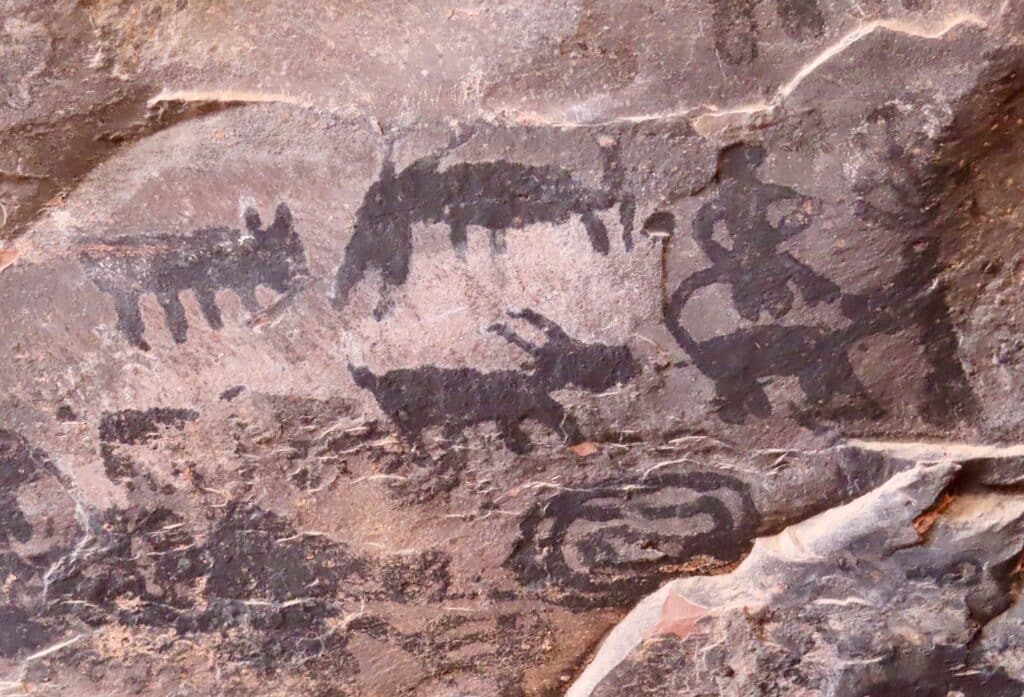
Geoglyphs
Rare, large-scale ground drawings created by scraping away desert surface material. They occur most often along the lower Colorado River. Learn more in our post, Desert Rock Art: Geoglyphs.
Across these different forms of rock art, you’ll notice a few recurring themes. Watch for spirals, anthropomorphic figures, animal tracks, sun symbols, geometrics and hunting scenes.
While interpretations vary, many images relate to migration stories, location of water sources and astronomical events. Many have ceremonial meanings.
Rock Art Viewing Tips & Etiquette
Rock art is irreplaceable—and fragile. Please help protect these sites:
- Don’t touch. Oils from hands accelerate erosion and darken surfaces.
- Stay on trails and avoid stepping on boulders or entering alcoves with sensitive pictographs.
- Never trace, chalk, or enhance images for photos.
- Use binoculars for distant panels—this avoids scrambling on unstable rock.
- Visit early or late in the day for better contrast and less glare.
- Take only photographs. Leave no trace of your visit.
Travelling respectfully ensures these places remain open for exploration. It’s a privilege not a right to view these traces of the past.
Easily Accessible Arizona Rock Art
1. Crane Petroglyphs (V Bar V Heritage Site)
V Bar V is home to one of the largest and best-preserved rock art panels in Arizona, featuring more than 1,000 individual images. Recently renamed, the Crane Petroglyph site is a fantastic introduction to Arizona’s petroglyphs and pictographs. Be sure to take a guided tour. The calendar markers here still align with solstice and equinox events.
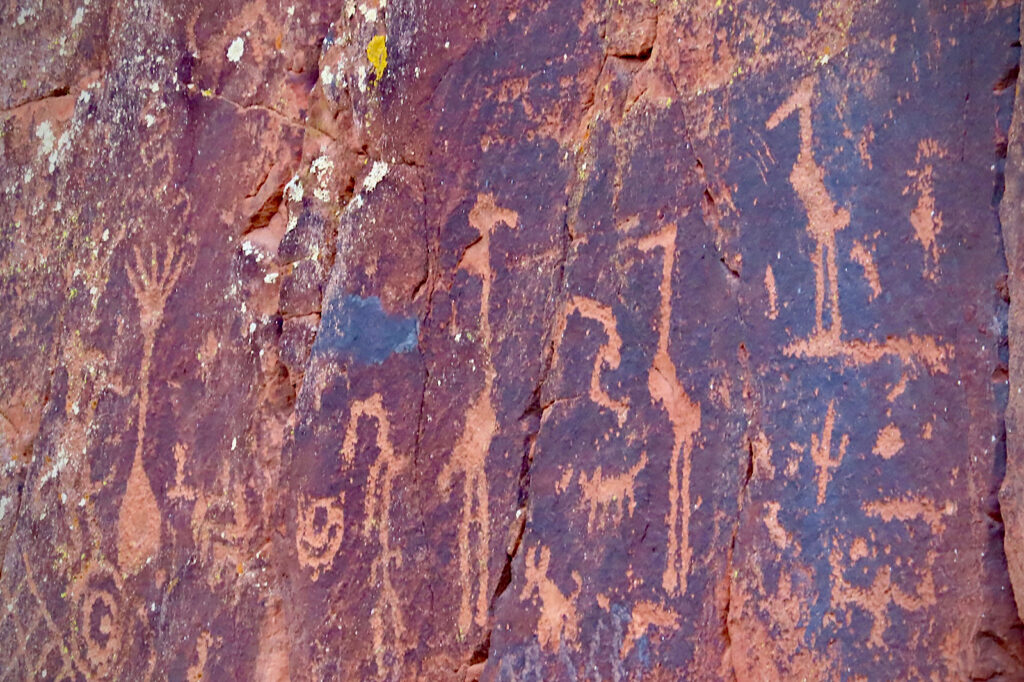
Visiting: Open seasonally; staffed by volunteers who provide excellent interpretation. Red Rock Pass required.
Directions: Located off Hwy 179 south of Sedona; easy 0.6-km walk from the parking lot.
Explore More: Crane Petroglyphs
2. Waterfall Canyon Rock Art
A favourite for Phoenix-area winter visitors, White Tank Regional Park’s Waterfall Trail features a series of Hohokam petroglyphs etched into dark boulders along the canyon. The images range from spirals to animals. A short, paved lower section makes it ideal for families. Interpretive signs help explain what you are seeing. It’s a busy little trail for good reason.
P.S. Don’t forget your camera!
Visiting: Entry fee required; open daily. We love camping in the park but it’s popular; be sure to reserve a campsite early. Best viewing of the petroglyphs is along the canyon narrows near the dry falls.
Directions: Located in West Valley off Olive Ave. The Waterfall Trail parking area is well signed.
Read more: Arizona’s White Tank Regional Park
3. Signal Hill Petroglyphs
With over 200 petroglyphs, this Tucson favourite in Saguaro National Park showcases classic Hohokam spirals and curvilinear designs carved into basalt boulders. You will have to share this beautiful spot with other visitors but take your time. Soak in the commanding views. If you’re lucky enough to have a moment alone, silence your thoughts and listen. The spirit of the site is still there.

Visiting: 0.3-km trail with stairs. Picnic tables nearby.
Directions: Located in Saguaro West near the Signal Hill Picnic Area.
Learn More: Sagurao National Park
Off-the-Beaten-Path Arizona Rock Art Sites
4. Picacho Mountains
Hidden among boulders northeast of Picacho Peak, these petroglyph clusters reward explorers with spirals, anthropomorphic shapes and unusual line work. There are thousands of images scattered over close to 20 different locations in the Picacho Mountains. We’ve explored this area twice now and will go back to discover more!
Visiting: Requires high-clearance access roads and short hikes on unmarked paths.
Directions: See the linked TimeTravelTrek guide for detailed directions and tips.
Read More: Picacho Petroglyphs
5. King Canyon Petroglyphs
Before the King Canyon Trail climbs toward Wasson Peak, it passes a small but beautiful cluster of petroglyphs tucked into a cliffside alcove. Lighting is key in this narrow canyon – with early morning being the best in my mind.

Visiting: About 0.5 km from the trailhead; you could do this as a quick stop or part of a longer hike to the summit. Note: parking lot is busy with hikers. Arrive early or after mid-day to find a spot to park
Directions: Trailhead is near the Desert Museum on the west side of Tucson.
Discover more: Hiking Wasson Peak
6. Saddle Mountain & Eagletail Wilderness Rock Art
These remote desert ranges offer unique boondocking (random camping) opportunities —and some of the most isolated rock art in central Arizona. Expect scattered panels on basalt boulders, including animals, circles and abstract shapes at Saddle Mountain. Take a day trip to the Eagletail Wilderness and hike into the panel walls.
Visiting: No services. High-clearance roads recommended.
Directions: Access from I-10 west of Phoenix.
Read More: This post about Saddle Mountain includes directions for both the Saddle Mountain and Eagletail Wilderness petroglyphs.
7. Loy Canyon Petroglyphs
This alcove and wall of petroglyphs can be found in a remote canyon tucked in between Palatki and Honanki east of Sedona. We’ve never seen anyone else both times we’ve visited, but this little beauty is far from a secret anymore.
Visiting: Sandy and rough road into parking area. Some route finding to reach the wash and route up to the site. Use All Trails to help you find the trail.
Directions: Loy Canyon is midway in between Palatki and Honanki. There is a signed trailhead and parking area. Follow the trail up for just over ½ mi (0.8 km) to a wash just past the end of a fenced-in ranch property. Head up the wash for just over ¼ mi (0.4 km). Watch for a small sign about an archaeological site. Head for the cliff on the left. There are vague trails to follow.
8. Dripping Springs Petroglyphs
This rugged wilderness east of Quartzsite hides hard-to-find petroglyphs along washes and canyon walls. The solitude alone makes this area worthwhile. Bonus boondocking opportunities off Interstate 8 make this an excellent place to stage out of while exploring.

Visiting: The site is remote and requires an ATV or mountain bike to access. A bit of scrambling and navigation is required; bring plenty of water.
Directions: Accessed by backcountry Forest Service roads (see details in our post linked below).
Learn More: New Water Mountain Wilderness
9. Petroglyph Wash (Near Lake Mead)
Off the beaten path adventure that turns petroglyph viewing into a treasure hunt is the best! I found the name “petroglyph wash” on a map. Gear Guru did a little internet sleuthing and found directions. Located on the northern edge of the Mount Wilson Wilderness Area, this site is about 30 miles southeast of Las Vegas in northwestern Arizona. It’s truly a hidden gem.
Visiting: This is a remote location requiring time, an ATV or mountain bike for access and good navigational skills to find – but it’s a great adventure none-the-less!
Directions: This one is complicated. These directions came from searching the web for various references. They got us here with only a little bit of second guessing! Crossing the bridge below Hoover Dam (coming from Boulder City NV), turn left (north) onto Temple Bar Road. Continue 13 miles (21 km) to where road curves to the right. Go straight onto Bonelli Landing Road. Continue 4 miles (6.4 km) to Cohenour Loop Road. Turn left and park (unless you have an ATV or want to bike/hike). We used mountain bikes to ride about 2 ½ miles (4 km) to enter Petroglyph Wash. Watch on left for petroglyphs which continue for about ½ mile (0.8 km).
Read More: While we didn’t include this adventure in our post about 11 Things to Do in Boulder City, NV, Boulder Beach Campground still makes an excellent basecamp. Check it out when exploring this corner of Arizona and its hidden rock art sites.
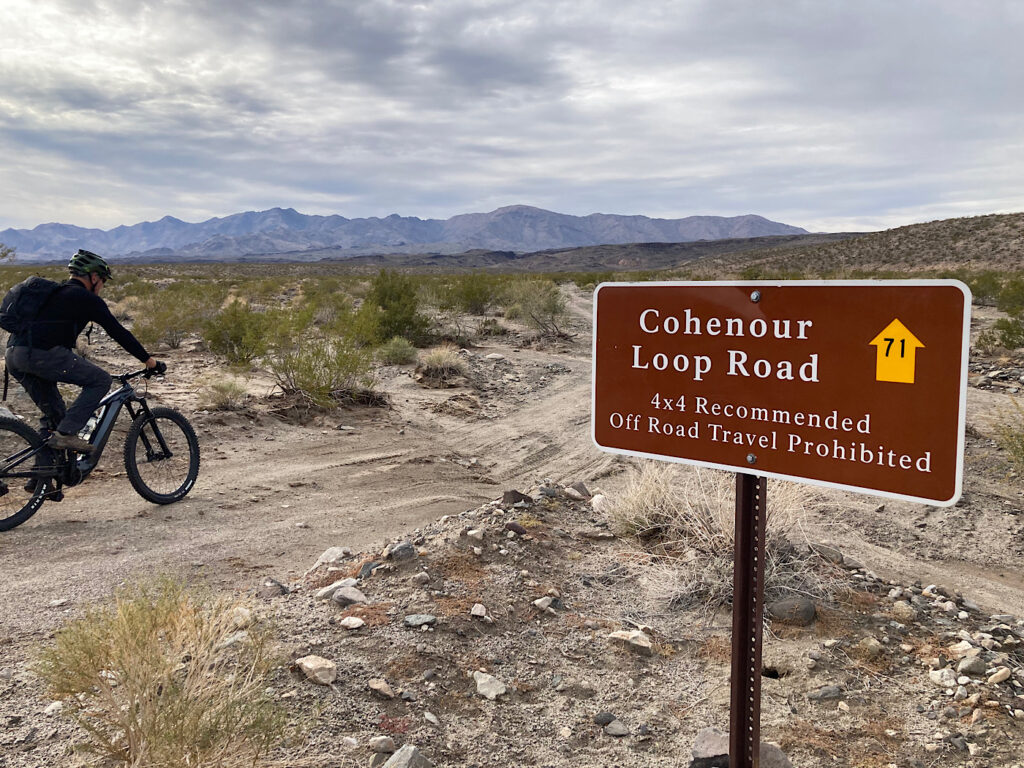
10. Sutherland Wash Petroglyphs (Near Catalina State Park)
This quiet site sits just outside the busy Catalina State Park. Panels line the boulders along the wash—spirals, grids, and possible calendar markings. We had the site completely to ourselves and literally had to drag ourselves away to get back to our nearby camp before sunset.

Visiting: Mostly flat but sandy hiking; great for photography during golden hour.
Directions: Access is via a sandy quad track/trail which leads towards Sutherland Wash; follow the directions in the linked post below.
Learn More: Read our post about Hip Camp? Adventures.
11. Council Rocks Pictographs
High on a granite hilltop overlooking the Dragoon Mountains, Council Rocks is a stunning place where Indigenous and later Apache history converge. Pictographs, petroglyphs, and incredible rock formations make this one of southeastern Arizona’s most rewarding sites in our minds. We parked near the random camping sites, hopped on our bikes and pedalled out to Council Rocks. Dropping the bikes by the road, we scrambled up on to the sandstone and wandered around until we found the rock art – oooh!

Visiting: Short hike off a 4WD road into the rocks with a bit of scrambling; spectacular views.
Directions: Accessed via dirt roads west of Sunsites; conditions vary but a 4WD or mountain bike will be needed to access the area beyond the random campsites. You’ll have to use a little sleuthing on your own to find the rocks and the art they hold – but that’s what will make it even more special!
Read More: RV Adventures Around Tombstone
12. Hum-Me-Chomp Petroglyphs
When I first heard about the Hum-Me-Chomp petroglyphs along the Colorado River, they were added to my list of must-sees. The fact that they are only accessible by water made it even more desirable. This site met the hype!
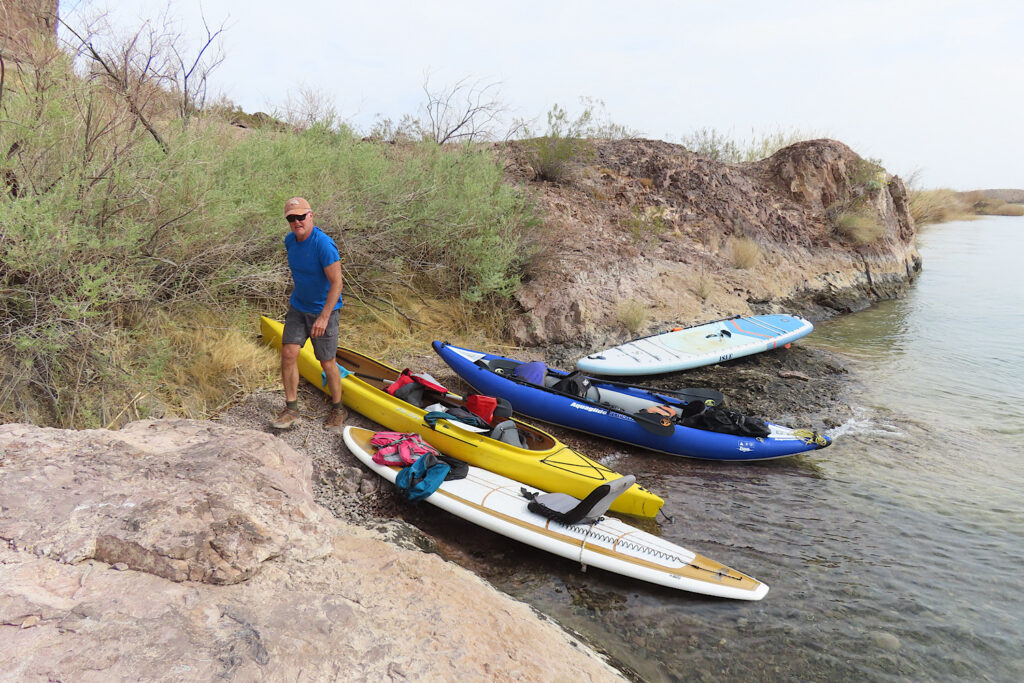
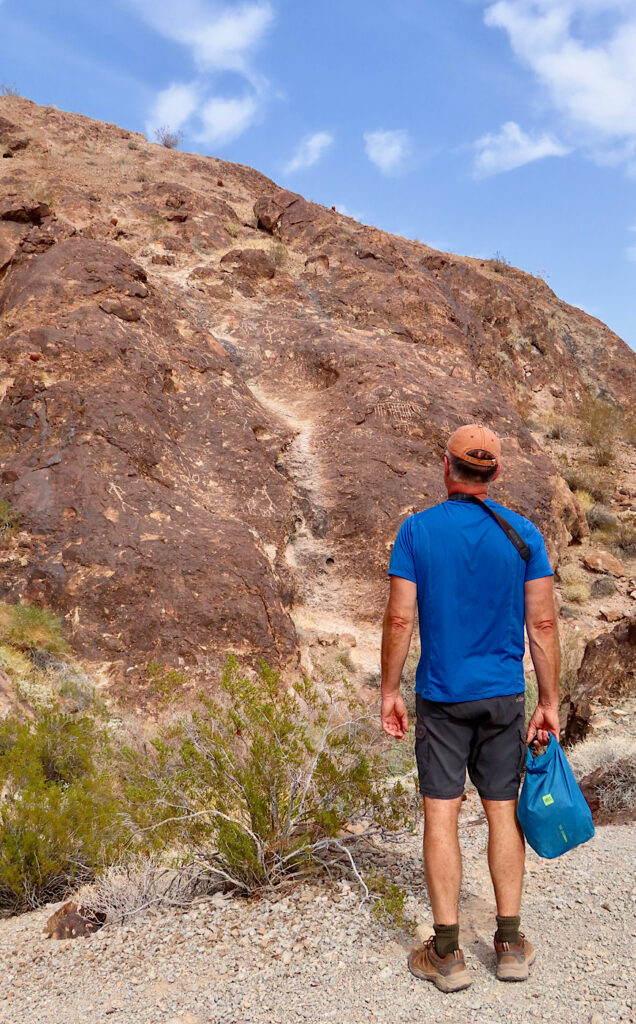
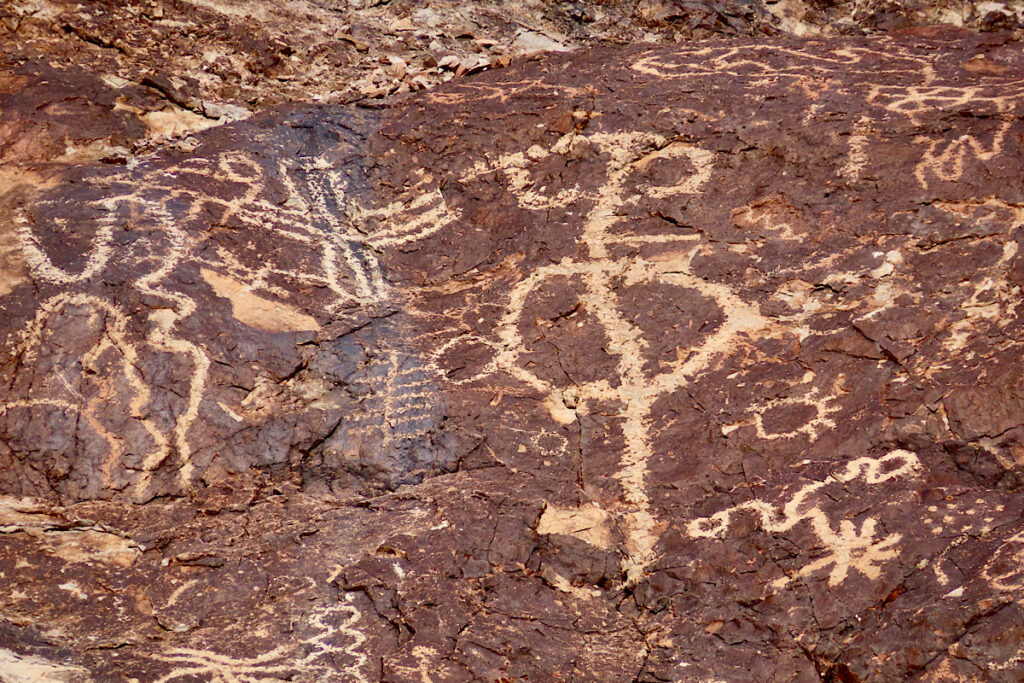
Visiting: Boat access only.
Directions: On the Colorado River between Topock and Castle Rock.
Read More: 9 of the Best Places to Kayak in Arizona
Final Thoughts
Arizona’s rock art sites range from easy roadside stops to rugged wilderness discoveries. Whether you’re parking the RV for a quick walk, hiking deep into a canyon or paddling down a river, each site offers a glimpse into a ancient world—one still very present on the rocks around us.
P.S. Ruins and rock art often go hand in hand – don’t miss our post on 12 Must-Visit Native American Ruins in Arizona!
Travelling thoughtfully and respectfully helps preserve these extraordinary stories for future adventurers. Happy exploring!
PIN THIS POST FOR FUTURE REFERENCE








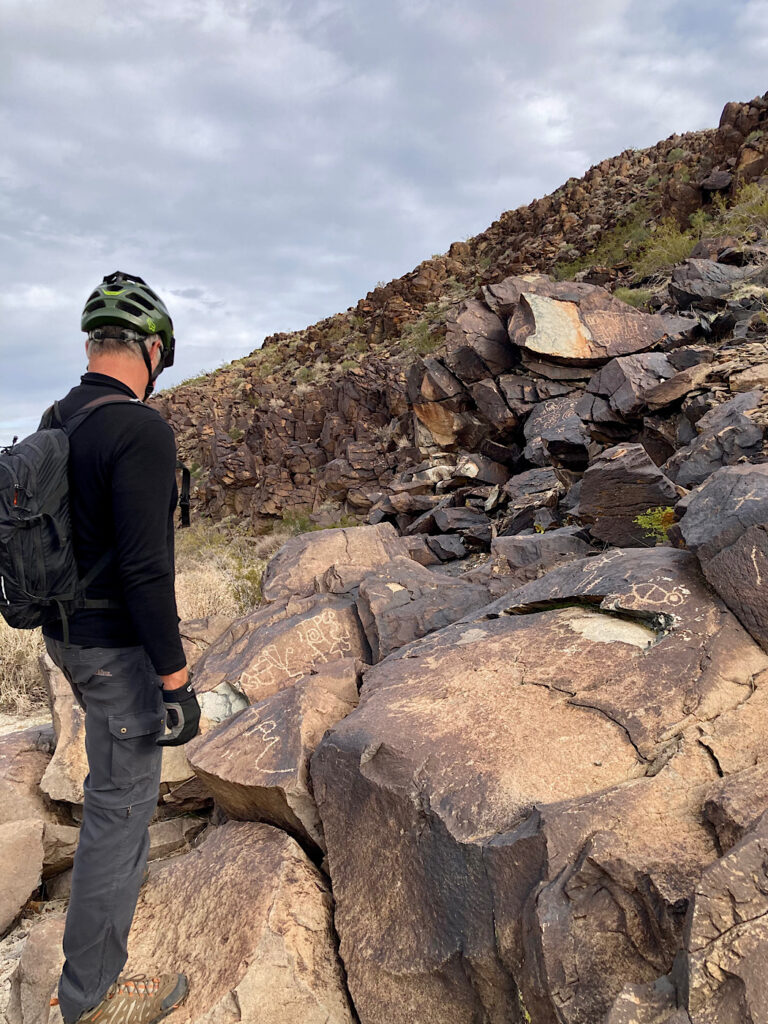

Leave a Reply